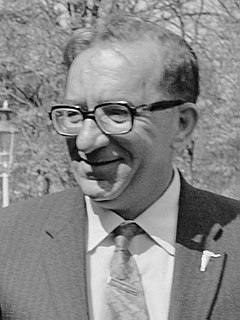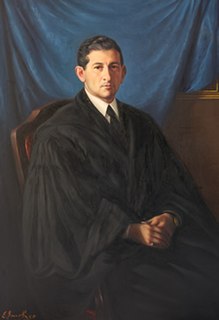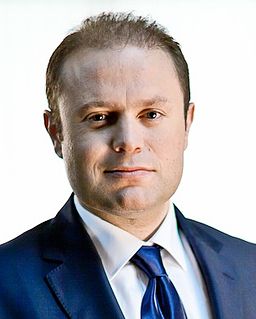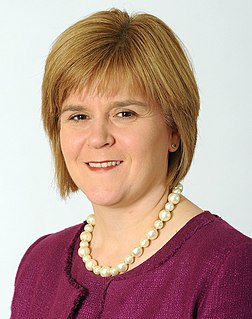| |||||||||||||||||||||||||||||||
| |||||||||||||||||||||||||||||||
All 65 seats of the Maltese House of Representatives | |||||||||||||||||||||||||||||||
|---|---|---|---|---|---|---|---|---|---|---|---|---|---|---|---|---|---|---|---|---|---|---|---|---|---|---|---|---|---|---|---|
| |||||||||||||||||||||||||||||||
| |||||||||||||||||||||||||||||||
 |
|---|
| This article is part of a series on the politics and government of Malta |
Republic |
| Foreign relations |
General elections were held in Malta on 12 December 1981. [1]

Malta, officially known as the Republic of Malta, is a Southern European island country consisting of an archipelago in the Mediterranean Sea. It lies 80 km (50 mi) south of Italy, 284 km (176 mi) east of Tunisia, and 333 km (207 mi) north of Libya. With a population of about 475,000 over an area of 316 km2 (122 sq mi), Malta is the world's tenth smallest and fifth most densely populated country. Its capital is Valletta, which is the smallest national capital in the European Union by area at 0.8 km.2 The official languages are Maltese and English, with Maltese officially recognised as the national language and the only Semitic language in the European Union.
Contents
For the 1981 elections, the opposition Nationalist Party, reinvigorated with a new leader, looked set for a serious challenge to Mintoff. In fact, in that election, the Partit Nazzjonalista managed an absolute majority of votes, but it managed only 31 seats to the Labour Party's 34. Dom Mintoff said that he would not be ready to govern in such conditions and hinted that he would call for fresh elections within six months. However, this was not to be: Mintoff eventually accepted the President's invitation to form a government. This led to a political crisis whose effects continued through much of the 1980s, as well as increasing political violence in the street.

The Nationalist Party is a Christian-democratic, conservative political party in Malta. It is one of two major contemporary political parties in Malta, along with the governing Labour Party. The Nationalist Party is currently in opposition to the Labour Party.

Domenico Mintoff, was a Maltese Democratic Socialist politician, architect, anti-colonialist revolutionary, and civil engineer who was leader of the Labour Party from 1949 to 1984, and was 8th Prime Minister of Malta from 1955 to 1958, when Malta was still a British colony, and again, following independence, from 1971 to 1984. His tenure as Prime Minister saw the creation of a comprehensive welfare state, nationalisation of large corporations, a substantial increase in the general standard of living and the establishment of the Maltese republic, but was later on marred by a stagnant economy and outbreaks of political violence.
Political violence is violence perpetrated by people or governments to achieve political goals. It can describe violence used by a state against other states (war) or against non-state actors. It can also describe politically-motivated violence by non-state actors against a state or against other non-state actors. Non-action on the part of a government can also be characterized as a form of political violence, such as refusing to alleviate famine or otherwise denying resources to politically identifiable groups within their territory.
The election resulted in controversy because although the Nationalist Party received a majority of votes, the voting system in use led to Malta Labour Party winning a majority of seats and governing the Maltese islands with a disputed mandate, until the 1987 elections. This provoked a constitutional crisis, with the Nationalist Party boycotting parliament.

The Labour Party, formerly known as the Malta Labour Party (MLP), is a social-democratic political party in Malta. Along with the Nationalist Party (PN), the Labour Party is one of two major contemporary political parties in Malta. Since the March 2013 general election, the party has been the governing party in the Maltese House of Representatives. The Labour Party is a member of the Party of European Socialists, and was a member of the Socialist International until December 2014.
In political science, a constitutional crisis is a problem or conflict in the function of a government that the political constitution or other fundamental governing law is perceived to be unable to resolve. There are several variations to this definition. For instance, one describes it as the crisis that arises out of the failure, or at least a strong risk of failure, of a constitution to perform its central functions. The crisis may arise from a variety of possible causes. For example, a government may want to pass a law contrary to its constitution; the constitution may fail to provide a clear answer for a specific situation; the constitution may be clear but it may be politically infeasible to follow it; the government institutions themselves may falter or fail to live up to what the law prescribes them to be; or officials in the government may justify avoiding dealing with a serious problem based on narrow interpretations of the law. Specific examples include the South African Coloured vote constitutional crisis in the 1950s, the secession of the southern U.S. states in 1860 and 1861, the controversial dismissal of the Australian Federal government in 1975 and the 2007 Ukrainian crisis.
As a result a compromise was reached whereby changes were made to the voting system to prevent a recurrence of the same problem. Under the new system if a repeat of the 1981 scenario occurs, the party supported by an overall majority of voters is awarded a number of additional seats from a party list, so that it secures a parliamentary majority. [2]











